May 22, 2025 | 17:15 GMT +7
May 22, 2025 | 17:15 GMT +7
Hotline: 0913.378.918
May 22, 2025 | 17:15 GMT +7
Hotline: 0913.378.918
Introduction:
At the Prime Minister's Conference with Farmers on May 29, Prime Minister Pham Minh Chinh demanded "more knowledge for farmers” to master technology in production and business and enrich themselves thanks to agriculture. Earlier, speaking at the 5th Central Conference, Minister of Agriculture and Rural Development Le Minh Hoan emphasized that “more knowledge for farmers” was a mandatory requirement.
The series "More knowledge for farmers" is conducted by Vietnam Agriculture News in the context that the agriculture industry is bound to change when it is on the path of approaching a new mindset - the era of knowledge economy.
“I started up as a farmer. From an office worker, an engineer, a 32-year-old teacher, I chose farming to start anew. Half a year without making a penny, not to mention other people, even my biological parents and brother criticized and ridiculed me while having this fear of becoming the laughing stock of the outside world because of me. "You had a job, a well-paid one at that, so why did you choose to do a job some illiterate guy can do?"
Even if there were explanations to be made, no one would care to lend an ear. But mother, you did not know that every profession required studying. I chose to do agriculture because I only live once. I want to live with what I am passionate about. I will try not to affect the finance of my wife, children and the family. I'm sorry, mother, for the thoughts you had of me that became too grand for you to bear."
A shared story in a group of farmers' associations received more than 1,000 likes and nearly 800 comments of agreement after only a few days. When I told this story to Mr. Tran Huy Duong, Chairman of Lang Biang Farm's Board of Directors in Lam Dong province, Da Lat city, he just laughed and said, “Millions of rural families once felt the same. In the past, it was true that if you can't study, you had to stick behind the buffalo to tend the fields. But now there is a saying: "None can succeed without the teaching of the wise".
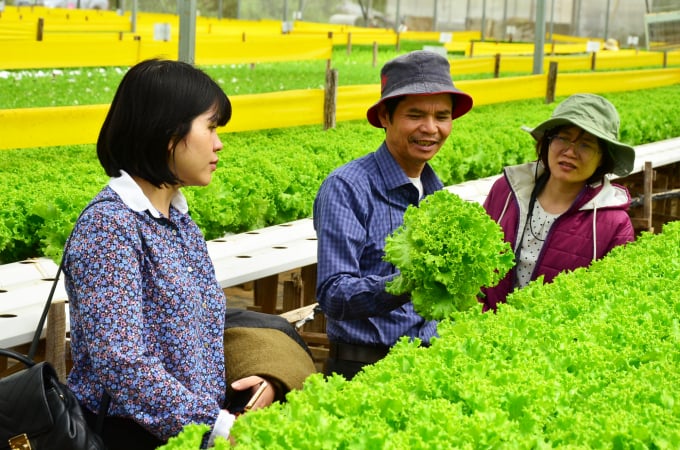
Lam Dong province's agricultural extension officer visited Mr. Duong's farm. Photo: Duong Dinh Tuong.
“I previously worked in telecommunications, when it was still a hot job. Getting in was itself a feat, and the position of head of the provincial post office was something people dreamed of. I did my part well and lived a proper life, that was why people adored me. I didn’t leave because of the conflict. Right in my resignation letter, the director signed but still wrote a note that if I ever felt the need to return, he would always be ready to receive me. Hearing about my resignation, many people advised me to withdraw that decision, including my parents, wife and children, colleagues, and friends. Some even told me that I was insane.”
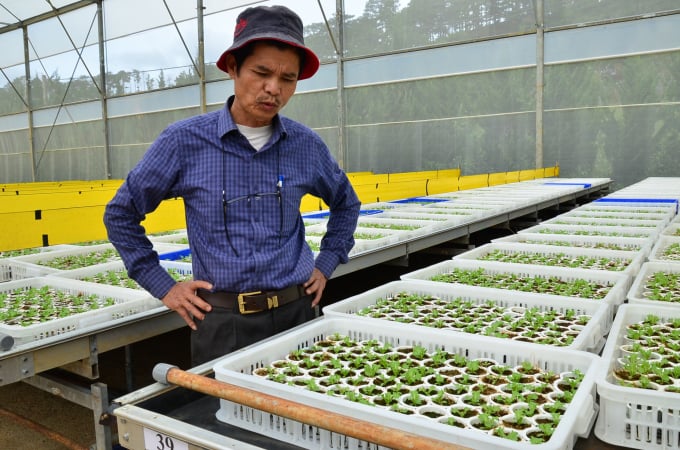
The vegetable growing shelf system in Mr. Duong's greenhouse. Photo: Duong Dinh Tuong.
And so in 2003 Mr. Duong started farming with 7 ha of land. Up to now, there have been 30 ha of land having his name as the owner, and his total assets both on the ground and on the land, if calculated in utmost modesty, must also be around VND 500 - 600 billion. His enterprise has become one of the first enterprises in Lam Dong to be certified to meet hi-tech agriculture standards.
He took me around to see some hydroponic, aeroponic, and soil farming polyhouses. The legs soon came to tiredness, and the body was covered in sweat, but the scenery still felt immense before my eyes. It might take me a whole day to go all the way, but just the polyhouses were already covering nearly half of the whole area. Entering a building of 6,000 m2 wide and 6m high, I could hear the noise from some grinding machines and saw the glittering arc light from the welder.
He said that this place could both produce hydroponic vegetables and install equipment for future use. When switching to the deep processing section, the vegetable would be mixed between various types and packed for immediate consumption or processed into functional foods or starch. That is the future Mr. Duong had put into consideration right from the planning stage.
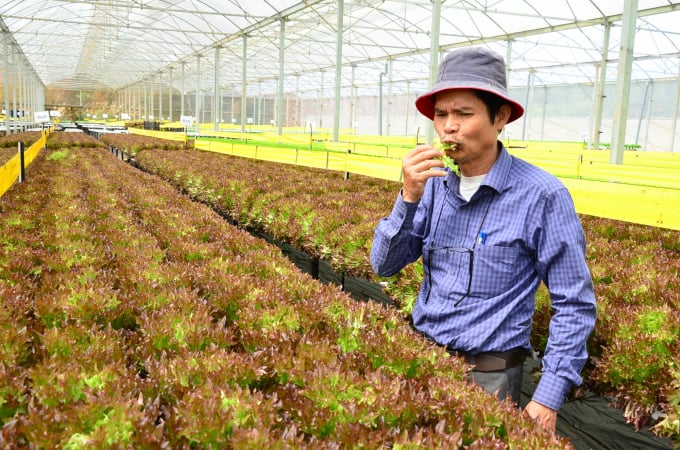
Mr. Duong eating vegetables right at the polyhouse with confidence. Photo: Duong Dinh Tuong.
“Like any other profession, we must first have a dream. I don’t really consider my dream a big one: accumulate land, devise planning, always update, always adjust to survive. People are taking 4.0 technology too simply. It’s not like you just take out the smartphone and touch some buttons to control irrigation, cooling or valves and that’s 4.0 technology. ”
Mr. Duong’s farm uses the full spectrum of technology: Technology 1.0 comprises manual steps such as planting trees and cutting flowers. Technology 2.0 includes mechanization of any stage possible from mowing, tilling, transporting to distributing fertilizer by machine and self-propelled vehicle. Technology 3.0 is represented in automation such as the Israeli irrigation system or the recent new irrigation systems of Spain and Vietnam. Technology 4.0 demonstrates superiority in business management with the main software being Germany's System Analysis Program (SAP) which connects all other component software such as irrigation, timekeeping, and sales in an optimal and instant way from A to Z.
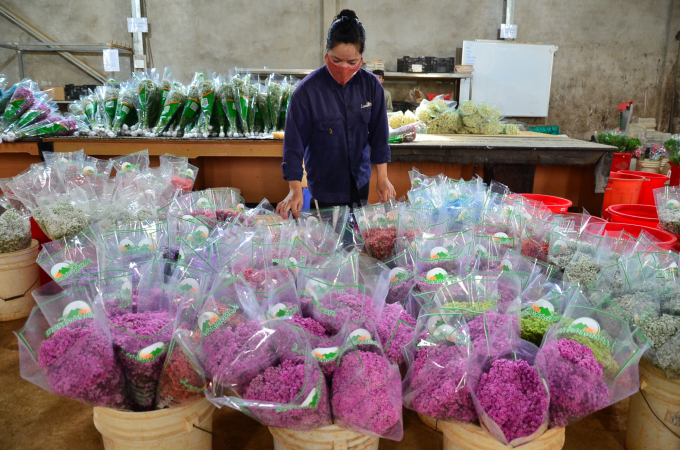
Flowers ready for sale. Photo: Duong Dinh Tuong.
“For example, regarding sales, the director needs to know the revenue, number of customers, sales volume, and selling price. If it was in the past, he would have to wait for the accountant to report on a weekly, monthly, or quarterly basis, but now he can get that information without delay. Whatever I can optimize, I do it right away. I spend money for work, not for games, so I need to carefully calculate the efficiency," Mr. Duong said.
Being modern as it is, the farm still takes advantage of by-products to compost into fertilizer, creating a closed economic circle. That is not something new because since 2003 Mr. Duong was conscious of this matter when starting the business. It became a code of conduct.
Workers, aside from ensuring hygiene while working, must classify the waste right from the source, not mixing organic and inorganic waste. That organic waste is composted along with coffee pods and mushroom residues bought from neighboring farms, saving Mr. Duong several billions of dong a year. Flowers and vegetables growing well, having beautiful colors and outstanding quality is all thanks to such an organic foundation.
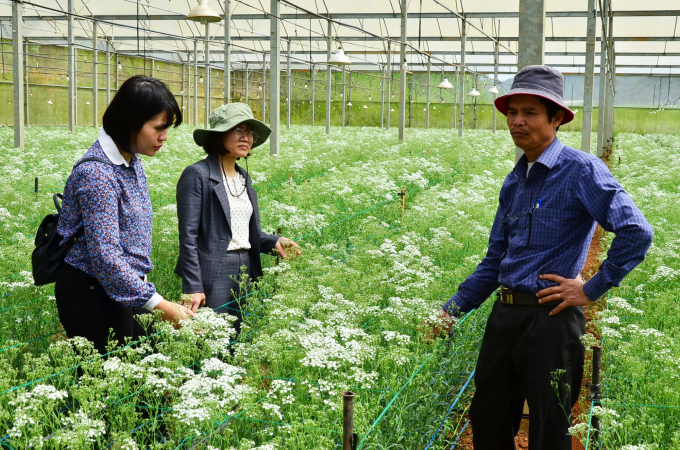
Flower garden in the polyhouse. Photo: Duong Dinh Tuong.
“In my opinion, improving knowledge for farmers means gathering lessons from many sources and factors of which the most important is to work hard yourself. Adapting to the market, consumer tastes, climate change, new technologies, making what people have done their own without applying a crude copy. With a heart of passion and a brain constantly full of thoughts, I find ways to learn from both successful and unsuccessful people. Those who fail sometimes teach us more valuable lessons than ones that achieve success. I often go to places where failures reside, listen to the people’s stories so that I don't repeat that failure. No more failure means no more price to pay for it.”
Translated by Samuel Pham
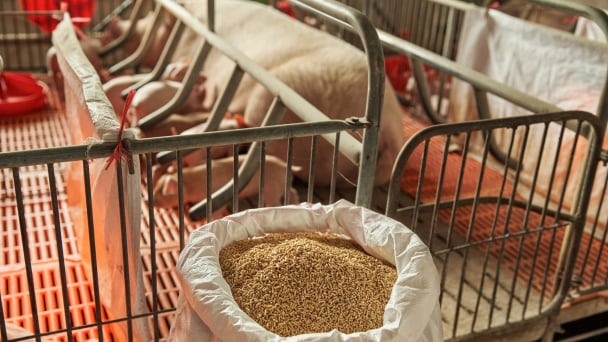
(VAN) CJ Feed&Care officially launched the FCR improvement campaign called “2025 Find Challenge Reach” in April 2025. In Vietnam, this campaign is implemented by CJ Vina Agri.
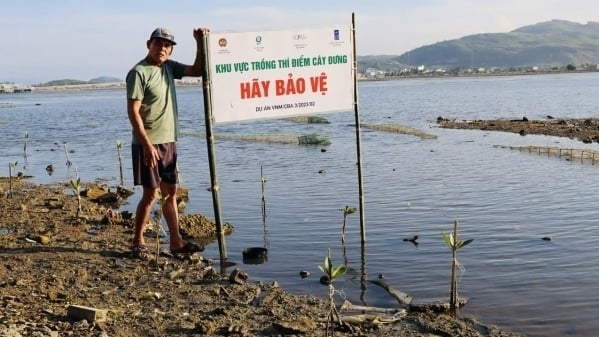
(VAN) The swamp in Pho Thanh is gradually being covered with red mangrove, creating a favorable environment for producing clean, high-quality salt.
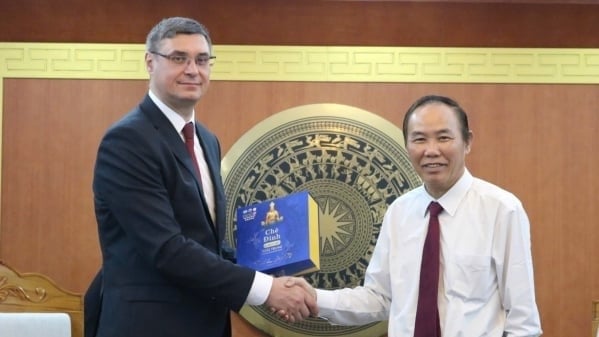
(VAN) The trade turnover of agro-forestry-fishery products is growing significantly, along with investment cooperation commitments that are opening up new development directions between Vietnam and Russia.

(VAN) Khanh Hoa is investing over 545 billion VND to develop 240 hectares of high-tech marine aquaculture in order to guarantee a consistent supply of seafood exports and achieve the USD 1 billion target.

(VAN) Minister of Agriculture and Environment Do Duc Duy held a meeting with Soopakij Chearavanont, Chairman of C.P. Group, on May 15.
/2025/05/16/3800-0-nongnghiep-143756.jpg)
(VAN) Suntory PepsiCo Vietnam coordinated with the Ministry of Education and Training to implement an education program on water conservation, reaching nearly 1 million primary school students nationwide.

(VAN) Vietnam’s TH Group officially put its high-tech fresh milk processing plant into operation in the Russian Federation, marking a historic moment as the first TH true MILK cartons were produced in Russia.